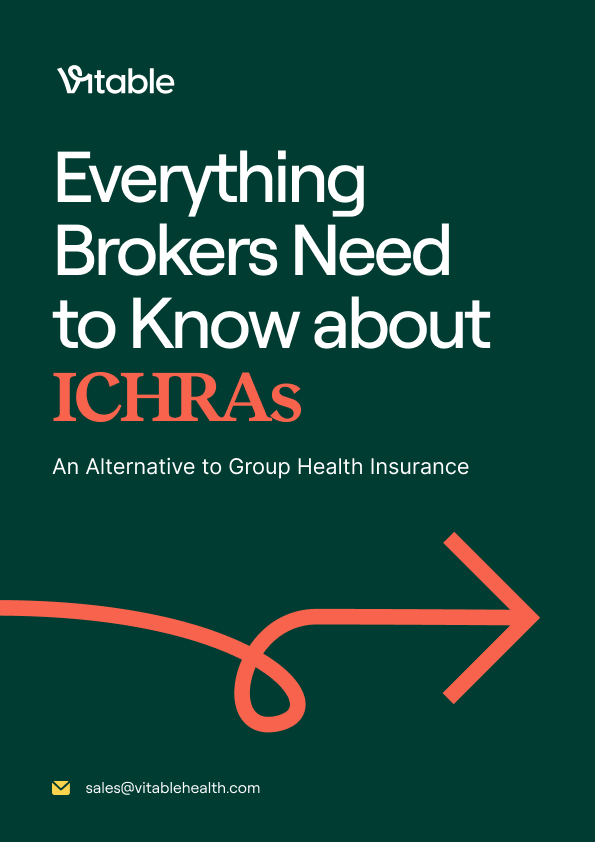What is a Qualified Small Employer Health Reimbursement Arrangement (QSEHRA)?

What is a Qualified Small Employer Health Reimbursement Arrangement (QSEHRA)?
More than half of small businesses don’t offer health benefits, not because they don’t want to, but because traditional group plans are expensive, complicated, and often not built for smaller teams. But here’s the thing: offering meaningful health coverage isn’t just possible for small employers — it can be simple, affordable, and flexible, too. That’s where the Qualified Small Employer Health Reimbursement Arrangement (QSEHRA) comes in.
A QSEHRA lets small businesses reimburse employees for medical expenses and health insurance premiums tax-free. It’s a smarter way to provide real healthcare support without the headache of managing a group insurance plan.
In this article, we’ll break down what a Qualified Small Employer HRA is, how a QSEHRA plan works, who qualifies, how it stacks up against other HRA plans like Individual Coverage HRA (ICHRA), and why choosing the right HRA administrator can make all the difference.
Defining a Qualified Small Employer Health Reimbursement Arrangement (QSEHRA)
A Qualified Small Employer Health Reimbursement Arrangement (QSEHRA) is a specific type of Health Reimbursement Arrangement (HRA) plan built for small businesses with fewer than 50 full-time equivalent employees. This is a flexible health benefit option specifically for small businesses. Unlike traditional group health insurance, a QSEHRA allows employers to reimburse employees for health insurance premiums and qualified medical expenses.
This arrangement gives both employers and employees more flexibility. The employer decides how much to contribute each year (within IRS limits), and employees choose the health plan or medical services that make sense for them and their families. Best of all, these reimbursements are tax-free for employees, as long as they have minimum essential coverage (MEC).
A QSEHRA is sometimes called a Qualified Small Employer HRA, a QSEHRA plan, or simply a small business HRA — but it always refers to the same benefit: helping small employers support their teams without the complexity of traditional insurance.
How Does a Qualified Small Employer HRA Work?
QSEHRA plans operate on a simple premise: employers reimburse, employees choose.
Instead of offering a group insurance policy, the employer sets a monthly or annual allowance, within IRS-established limits, and employees can use those funds to pay for health insurance premiums or eligible medical expenses. Employees submit proof of their expenses, and the employer reimburses them, tax-free.
To keep things compliant and running smoothly, there are a few key requirements:
- The employer must provide the same terms to all eligible employees. Employers can adjust reimbursement amounts to account for employee ages and the number of individuals covered.
- Employees must maintain minimum essential coverage (MEC).
- Employers must follow IRS reporting rules and provide timely notice to employees.
This setup gives employees autonomy to find plans that suit their needs — whether that’s a marketplace plan, coverage through a spouse, or another qualifying option.
Eligibility Criteria for QSEHRA Plans
QSEHRA plans are designed for small businesses, but not every employer qualifies. Here’s what you need to know:
To offer a QSEHRA, an employer must meet specific criteria:
- The employer must be a small business with fewer than 50 full-time equivalent employees.
- The employer cannot offer a group health plan to any employee.
- The employer must offer all eligible employees the QSEHRA on the same terms.
Employees are eligible for QSEHRA reimbursements if they:
- Are full-time employees (part-time employees may be eligible under certain circumstances).
- Have minimum essential coverage (MEC).
Benefits of Implementing a QSEHRA Plan
A QSEHRA plan offers several benefits for both employers and employees, including cost savings, flexibility, and dual tax advantages. These combined benefits make QSEHRA an attractive option for both employers and employees seeking affordable and flexible healthcare coverage.
Cost
Employers: QSEHRA plans give small businesses control over their healthcare spend. You set a budget-friendly monthly reimbursement allowance that fits your bottom line — no surprises, no runaway costs. Since there are no insurance premiums to manage, you get predictability and cost control while still offering a competitive health benefit.
Employees: With a QSEHRA, employees can get reimbursed for qualified medical expenses and health insurance premiums tax-free. This reduces their out-of-pocket costs and puts money back in their pockets for the care they actually use, without being tied to one-size-fits-all group coverage.
Flexibility
Employers: You’re no longer locked into a single group health plan or forced to manage provider networks. QSEHRA plans give you the ability to offer real health benefits without the administrative lift.
Employees: QSEHRA plans empower employees to choose the health insurance and services that best match their needs and budget. Whether it's an individual policy, a family plan, or a combination of medical expenses, they’re in control of how they use their benefit.
Tax Advantages
Employers: Reimbursements made through a QSEHRA are tax-deductible, which helps reduce your business’s overall tax liability. It's a smart way to support your team while keeping your expenses efficient.
Employees: As long as employees maintain minimum essential coverage (MEC), their reimbursements are tax-free, meaning that money is not subject to income or payroll taxes. That’s real money saved on both sides.
Access
Employers: A QSEHRA is more than a reimbursement tool—it’s a pathway to coverage. It qualifies as a life event, allowing employees to enroll in health insurance mid-year and access Marketplace subsidies. For businesses that can’t afford group coverage, it’s a cost-effective way to support enrollment and encourage employee wellbeing.
Employees: QSEHRAs expand access to coverage and financial support. If the allowance is unaffordable, employees can still claim tax credits (reduced by the QSEHRA amount). If it’s affordable, the QSEHRA covers a meaningful share of premiums. Either way, it helps employees get and stay covered on their terms.

Download 2025 Employer Guide to ICHRA
Vitable’s ICHRA Guide gives employers a clear, step-by-step resource for building smarter, ACA-compliant benefits.
This guide explains how ICHRAs work, who qualifies, and how Vitable simplifies setup, onboarding, reimbursements, and compliance — while giving employees more flexibility, control, and care.

Download Vitable’s 2025 Broker’s Guide to ICHRA
The Broker Guide to ICHRAs is a comprehensive resource that helps brokers understand, sell, and manage Individual Coverage HRAs with confidence.
This guide covers everything from compliance and class design to administration flows, case studies, and how Vitable streamlines quoting, enrollments, and reimbursements for brokers, employers, and employees.
How to Set Up a QSEHRA Plan
Setting up a QSEHRA plan is more straightforward than managing a traditional group plan, but there are still several steps involved to ensure compliance, clarity, and a smooth rollout for your team. Here’s what to expect:
Hire an HRA Administrator:
Before diving into plan design or paperwork, one of the most important steps you can take is hiring an HRA administrator. A QSEHRA plan may be easier to manage than a group plan, but it still comes with rules, deadlines, and documentation requirements, and that’s where an experienced administrator makes all the difference.
Your QSEHRA administrator acts as the bridge between your team and the benefit itself, delivering a smooth employee experience while helping you stay compliant with IRS requirements. From plan setup and employee onboarding to claims processing and reporting, they handle the heavy lifting so you don’t have to.
Here’s what your HRA administrator typically manages:
- Designing and drafting legal plan documents
- Handling employee onboarding and communications
- Reviewing and approving reimbursement claims
- Ensuring IRS compliance and documentation
- Providing ongoing support to both the employer and employees
With the right HRA administrator, the rest of the steps will be easy. Learn more about HRA administrators here!
Determine Eligibility
Before launching a QSEHRA, make sure your business qualifies:
- You must have fewer than 50 full-time equivalent employees.
- You cannot offer a group health insurance plan.
- Eligible employees must have a MEC plan to receive tax-free reimbursements.
Decide Your Budget
Start by deciding on a monthly reimbursement allowance that works for your business. This amount must fall within the IRS contribution limits (more on that below) and should reflect what you’re comfortable spending to support your team.
Design Your QSEHRA Plan
You’re in the driver’s seat when it comes to building your QSEHRA. Draft a plan outlining the arrangement’s terms and conditions, such as:
- How much will you reimburse each month?
- What expenses will be eligible (just premiums, or out-of-pocket medical expenses too)?
- Will you include part-time employees?
- Will there be a waiting period before new hires become eligible?
- When will the plan officially begin?
From there, your HRA administrator will take care of creating your legal plan documents. They will handle the paperwork and accounting so you don’t have to.
Provide Employee Notice
To stay compliant with IRS requirements, you’ll need to give employees written notice about their QSEHRA benefits each year, and timing matters. The notice must be delivered at least 90 days before the plan year begins (or on or before the day an employee becomes eligible mid-year, such as during onboarding).
This notice should include:
- The employee’s total QSEHRA benefit amount for the year
- A reminder that they must report this amount when applying for Marketplace subsidies or premium tax credits
- Explanation that employees must have Minimum Essential Coverage (MEC) to avoid tax penalties (IRC Section 5000A) and that any reimbursements received without MEC in place may be treated as taxable income
If you plan to offer a QSEHRA starting in 2026, for example, the notice should go out by the beginning of October 2025. Your HRA administrator can assist with preparing and distributing these notices to ensure your team receives the right information at the right time.
Implement Administration Procedures
You’ll need a system in place to collect, verify, and process reimbursement requests. That includes reviewing supporting documentation, issuing payments, and tracking allowance balances throughout the year. Your HRA administrator can manage this for you.
QSEHRA Rules, Limits, and Compliance Requirements
Offering a QSEHRA involves adhering to specific IRS guidelines. Here's what employers need to know for 2025 regarding contribution limits, reimbursement rules, and reporting obligations.
QSEHRA Contribution Limits for 2025
For the 2025 tax year, the IRS has set the following maximum annual reimbursement limits for QSEHRAs:
- Self-only coverage: $6,350 ($529.16 per month)
- Family coverage: $12,800 ($1,066.66 per month)
These limits represent an increase from the 2024 limits of $6,150 for self-only coverage and $12,450 for family coverage. Employers can choose to offer any amount up to these limits. For employees who become eligible mid-year, the annual limit should be prorated based on the number of months they are eligible.
QSERA Reimbursement Rules
To ensure tax-free reimbursements under a QSEHRA:
- Eligible Expenses: Reimbursements must be for qualified medical expenses as defined by the IRS, which can include individual health insurance premiums and out-of-pocket medical costs.
- No Double Dipping: Expenses already reimbursed by another source or premiums paid with pre-tax dollars cannot be reimbursed again through a QSEHRA.
- Documentation: Employees must provide proper documentation, such as receipts or insurance statements, to substantiate each claim.
Additionally, employees must maintain a MEC plan to receive tax-free reimbursements. Reimbursements made during months without a MEC plan may be considered taxable income.
Compliance and Reporting
Employers offering a QSEHRA must:
- Provide Annual Notice: As mentioned above, you are required to deliver a written notice to eligible employees at least 90 days before the start of the plan year or upon eligibility.
- Report on Form 1095-C: Employers offering a QSEHRA may need to report certain information to the IRS. This includes the total reimbursements made under the QSEHRA and the number of employees participating. The reporting requirements are fulfilled through the annual filing of Form 1095-C.
Staying compliant with these requirements ensures that both employers and employees can fully benefit from the QSEHRA's tax advantages.
Are There Other Types of HRA Plans?
There are several other types of HRA plans, including the ICHRA (Individual Coverage HRA), EBHRA (Excepted Benefit HRA), and Integrated HRA for use with group health plans. However, QSEHRA and ICHRA are the most popular options for employers looking to offer flexible, tax-advantaged healthcare benefits.
While both HRA plans serve similar goals, there are important distinctions between ICHRA and QSEHRA:
- Eligibility: QSEHRA is limited to small employers with fewer than 50 full-time equivalent employees. ICHRA, on the other hand, can be offered by employers of any size.
- Group Health Plan Restrictions: Employers offering a QSEHRA cannot also offer a group health plan. ICHRA allows group plans, but only for different classes of employees.
- Reimbursement Limits: QSEHRA plans have annual IRS-set caps, while ICHRA plans have no maximum reimbursement limits, offering more flexibility for larger or more complex organizations.
For small businesses, a QSEHRA offers significant advantages over traditional group health plans:
- Cost control: Set predictable reimbursement limits that work for your budget.
- Employee choice: Let employees choose the coverage that works best for them and their families.
- Tax benefits: Both you and your employees enjoy tax savings on contributions and reimbursements.
Why Choose Vitable as Your HRA Administrator?
Vitable isn’t just another HRA administrator — we’re a health benefits platform on a mission to make healthcare better for everyday workers. We help businesses of all sizes offer real, affordable benefits without the complexity of traditional insurance. With Vitable, employers can easily roll out a QSEHRA plan while giving employees access to meaningful care.
Plus, every QSEHRA plan through Vitable comes with our enhanced primary care membership, which includes:
- In-home and virtual visits from licensed primary care providers
- Over 1,000 free prescriptions and lab tests
- Access to mental health support
- 24/7 care coordination for a seamless healthcare experience
- Easy-to-use digital platform
For your employees, it’s a better way to get care. For your business, it’s a smarter, simpler way to offer competitive benefits that boost retention and morale.
Vitable makes QSEHRA simple
Setting up a QSEHRA with Vitable is easy and built around your business. What we can do:
Meet with our team: We’ll walk you through how QSEHRA works and provide a personalized proposal showing your cost savings and the plan options best suited to your team.
Customize your QSEHRA: Help define your monthly reimbursement limits, choose which expenses you want to cover, and tailor the benefit to your company’s needs.
Invite your employees: Vitable handles employee onboarding, eligibility tracking, and communications. Your team is supported every step of the way.
Manage reimbursements: Employees submit claims through our easy-to-use platform. We can review and approve reimbursements quickly and confidently.
Stay compliant: We handle the IRS-required employee notices, track documentation, and generate the reports you need to file — no guesswork, no stress.
Ready to start offering better benefits?
Get started today — schedule a free call with a Vitable team member and see how easy it is to launch a QSEHRA that works for your team and your bottom line.
Ready to learn more?
Stay ahead with the latest insights on healthcare, benefits, and compliance—straight to your inbox.
Get a quote
Get a personalized health benefits quote tailored to your company’s unique needs.
Vitable helps employers provide better healthcare to their employees and dependents by improving accessibility, cost, and quality.
